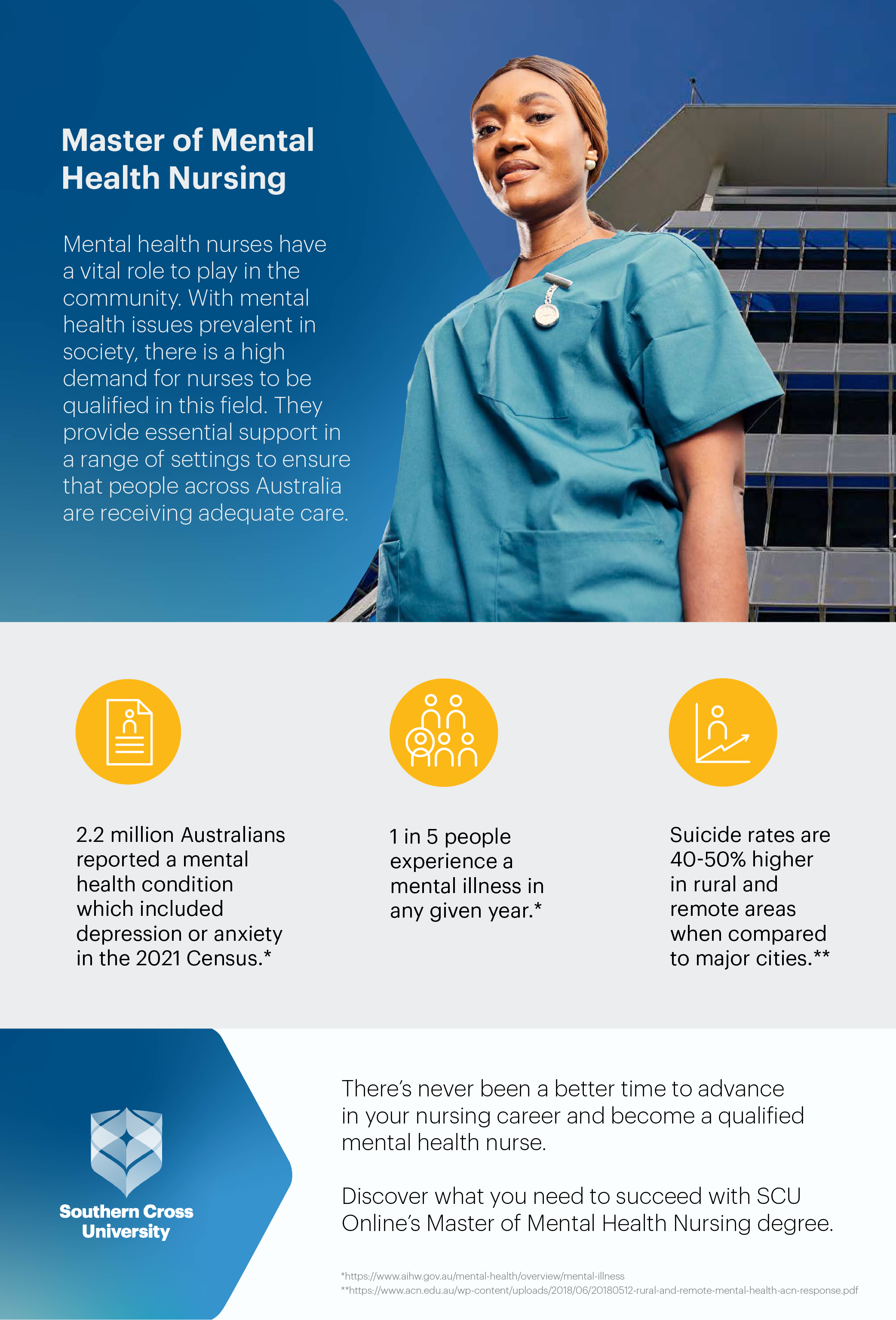Community-based mental health nurses play a vital role in Australia’s healthcare system. With 1 in 5 people experiencing a mental illness in any given year, the demand for mental health support continues to rise.
Data from the Australian Institute of Health and Welfare shows that, since the beginning of the COVID-19 pandemic, the number of Australians using mental health and crisis services has increased. To meet this demand, it’s essential that communities across Australia have access to adequate and appropriate mental healthcare in hospitals and clinics and via other healthcare providers.
Various socioeconomic factors, such as access to services, living conditions and employment status, can influence someone’s mental health. This impact is not limited to the individual but extends to their families and caregivers. As such, a community mental health nurse’s role is to provide all affected individuals with the support they need.
Interested in pursuing a career as a mental health nurse in Australia? In this article, we’ll look at the fundamentals of mental health nursing in the community, the key tasks and responsibilities of the role and the education and training required to excel in the field.
What is the role of a community-based mental health nurse?
The role of a community mental health nurse is to provide vital mental health care and support to people in the local community, primarily those in a community setting (where people live and work), rather than in hospital settings. Mental health nurses often spend extensive time early in their careers working in acute settings such as emergency departments and inpatient units.
“Mental health nurses are the only health professionals who spend lengthy periods of time with people in extreme states of distress and unwellness over 24-hour periods. This uniquely positions mental health nurses to communicate empathetically with people when they are most vulnerable, recognise deterioration and respond accordingly,” says Richard Lakeman, associate professor of Mental Health at SCU Online.
According to the 2021 Census, more than eight million Australians reported being diagnosed with a long-term health condition, with 2.2 million reporting a mental health condition that included depression or anxiety.
Mental health nurses work primarily with people who have the most complex psychosocial needs, sometimes called the ‘missing middle’ in the stepped care model of mental health in primary care. Such people may experience or be at risk of homelessness, risk of incarceration or hospitalisation and existing services offered in primary care are often inadequate or ineffective.
These nurses provide mental health care services not only to the affected individuals but also to their families and communities. They work closely with other healthcare professionals as needed and community organisations to ensure patients receive the best possible care.
Nurses who work in mental health in the community must maintain ongoing training and professional development to stay current with the latest research, treatments and approaches. They must also continue to acquire first-hand experiences to increase their confidence and capabilities in complex situations.
The responsibilities of a community-based mental health nurse
Mental health nurses have the qualifications, skills and experience to provide high-quality care in all environments. They promote good physical and mental wellbeing and act as liaisons between patients and their healthcare providers.
Community mental health nurse roles and responsibilities can vary greatly. Here’s a snapshot of some of their tasks.
-
They conduct mental health assessments to identify their patients' specific needs, and they also develop personalised care plans that outline treatment and next steps.
-
They adapt counselling and psychotherapy techniques for people with complex needs.
-
They provide expert advice and often administer medical treatments, including medications. They are experts in managing adverse medication events and monitoring and addressing the physical impacts of psychiatric medication.
-
They are expert in communicating with empathy with people who have extraordinary experiences and adversity. They assist people in navigating and problem-solving complex situations.
-
They work confidently and collaboratively with other healthcare professionals and specialists, such as psychiatrists, to ensure people receive the best possible care.
How are mental health services delivered in the community?
As a mental health nurse working in the community, an essential part of your role will be to ensure the consistency of the support given to your patients. This can be likened to a form of case management.
“Case management has been well developed and researched as the primary model of service delivery in community mental health services,” says Lakeman. “At its best, clinical case managers are the primary providers of whatever treatment is necessary. They assist with problem-solving and coordinating services for a person to ensure continuity of services and to overcome system rigidity, fragmentation of services, misuse of facilities and inaccessibility.”
A community mental health nurse is a specialist who has undertaken postgraduate study and generally has received at least two years of supervised practice. They receive referrals from psychiatrists and general practitioners. They often adapt psychotherapy to work with people with the most complex needs and will liaise with others in the health and welfare system.
A community mental health nurse may also be the liaison between a patient and their healthcare provider, working to continually assess their situation and develop a care plan to support their mental health.
Working as the human link between the service user (or patient) and the service system becomes an integral part of providing support as a mental health nurse.
Challenges of community-based mental health services
Working as a mental health nurse in the community can be multifaceted and complex.
Barriers to accessing mental health services can include:
- being physically unable to access local services
- being tied down by financial hardships
- having a limited understanding of mental health
- challenges of navigating the healthcare system
“Mental health nurses understand how the system works and are able to simplify and streamline processes,” says Lakeman. “They will often be the primary provider of specialist services for an individual for extensive periods of time in ‘outreach’ rather than ‘clinic-based’ capacities. They can and do, when necessary, refer to and liaise with other service providers.”
Mental health services in rural and remote localities face more significant challenges when compared with major cities across Australia. The rate of suicide in these areas is roughly 40–50 per cent higher, and access to mental health services can be limited.
People living in these areas are also more likely to struggle due to isolation, loneliness, fewer job opportunities and drug and alcohol abuse. Further challenges can be caused by having fewer transport options, struggling with mobility — particularly for the elderly — and experiencing adverse weather, namely for those working in industries reliant on farming, mining, tourism, fishing or forestry.

Where else do mental health nurses work?
Mental health nurses work in a variety of settings, including metropolitan, regional, rural and remote areas. They can also be found in hospitals, doctors’ clinics, community centres and aged-care facilities, making them a vital resource for people and communities nationwide.
They offer holistic care and consider not only their patients’ comprehensive needs but also their recovery goals.
Let’s take a closer look at some of the other settings where you might work as a mental health nurse.
Hospitals
Mental health nurses play an essential role in providing care to patients with mental health conditions inside hospital settings. Here, you might work in psychiatric wards, emergency departments or outpatient clinics, providing support on various potentially complex cases.
When it comes to identifying and treating patients who may be experiencing a range of mental health conditions — from anxiety and depression to more severe conditions such as bipolar disorder and schizophrenia — the expertise and further training that mental health nurses bring to these situations makes them invaluable.
Mental health nurses work in hospital settings such as psychiatric wards, emergency departments and outpatient clinics. They provide care to patients with a range of mental health conditions and may work with multidisciplinary teams to manage complex cases.
Correctional facilities
As a mental health nurse in a correctional facility, you will support inmates by assessing and diagnosing mental health conditions, developing treatment plans, and providing ongoing care.
Mental health conditions such as depression, anxiety and post-traumatic stress disorder (PTSD) require ongoing care, whereby patients must receive medication, individual counselling and group therapy. It will fall within your remit to manage these responsibilities.
In addition to providing care to inmates, mental health nurses in correctional facilities also provide support to correctional facility staff and employees. This may involve providing education and training on mental health issues, crisis management and de-escalation techniques.
Mental health nurses provide mental health care to individuals in correctional facilities, including prisons and detention centres.
Aged care facilities
As the population ages, the need for mental health care among the elderly will become increasingly important. As a mental health nurse in an aged-care facility, you will play a crucial role in providing care and support to elderly individuals who may be experiencing dementia, depression and anxiety.
You will work to develop personalised care plans to address the unique needs of each of your patients. You will also provide counselling and support to patients and their families, working collaboratively with other healthcare professionals to ensure the correct care is provided.
Mental health nurses may provide care to elderly individuals in residential aged care facilities or in the community to address mental health needs specific to the elderly population.
Schools
Mental health nurses working in school settings play a vital role in supporting the mental health needs of their students. By working in a school, you will have the opportunity to build trusting relationships with staff, students and their families as you care for the various cohorts.
Working closely with the teachers and staff, you will identify and address mental health concerns the students may have. You will also act as an additional support system in the school setting, providing counselling and support to students, developing educational programs to promote mental health awareness, and collaborating with other healthcare professionals when required. Where needed, you will be trusted to act as a liaison between the school and the families.
Mental health nurses may work in schools to support students' mental health needs and provide guidance to teachers and staff.
Non-governmental organisations (NGOs)
Mental health is fast becoming a larger part of the NGO sector, with organisations seeking to provide mental health support for those already connected with their businesses in relation to the social or financial struggles they may be experiencing.
As a mental health nurse in this industry, you will have numerous responsibilities. These will include providing counselling and support, developing educational programs to help people become aware of their own mental health, and providing outreach services to individuals in the community.
You may also be charged with collaborating with other healthcare professionals or organisations to ensure your patients have access to the support they need. Mental health nurses work with NGOs to provide mental health services to individuals who might be experiencing financial or social disadvantages.
5 reasons why a nurse might consider specialising in mental health
Looking for a career change, or considering moving into a different area of nursing where you can make a positive impact in your patients’ lives? Mental health may be for you. There are many benefits to specialising in mental health, but let's take a look at the top five.
1. High demand for mental health services
More and more Australians are accessing mental health support services. With this high demand for extra support comes a need for more mental health nurses.
2. Opportunity to make a difference
Mental health nurses can make a significant difference in the lives of their patients. They work with vulnerable patients who are often in dire need of support. Mental health nurses can also help their patients achieve better outcomes, which can be incredibly rewarding.
3. Variety of roles and responsibilities
Mental health nurses can work in a variety of settings, including hospitals, community health centres and mental health clinics. They may work with individuals, families or groups, and their responsibilities can include assessments, care planning, medication management and counselling.
4. Professional growth and development
Specialising in mental health can provide nurses with opportunities for professional growth and development. There’s an opportunity for additional training or education, such as a masters degree in mental health nursing. Working with numerous healthcare professionals can also broaden their knowledge and experience.
5. Job security
The demand for mental health nurses is expected to grow in the coming years. This demand provides job security for mental health nurses, making it an attractive career option for those looking for stability and long-term career opportunities.
The skills and qualities required to work as a mental health nurse
Mental health nurses working in the community require a range of skills and qualities to succeed in their roles. These include:
-
excellent communication and interpersonal skills
-
the ability to work collaboratively with other healthcare professionals
-
a high level of empathy, compassion and patience
-
counselling and crisis intervention
-
assessment, diagnosis and treatment planning
-
medication management and monitoring
-
critical thinking and problem-solving skills
Lakeman has more than 30 years of experience working in the field of mental health. He shares his thoughts on the qualifications mental health nurses are expected to have.
“A mental health nurse is somebody who’s credentialed by the Australian College of Mental Health Nurses. In addition to a graduate diploma in mental health nursing, a nurse generally needs to have a minimum of two years of supervised practice in an acute setting.
“All nurses, almost universally, are expected to have experience working in an acute mental health setting,” he continues. “But, generally speaking, we would expect to see that they would rotate and spend at least six months during those two years working in a community setting to gain the right experience.”
Working in a community setting means understanding a patient’s needs in the context of their circumstances and health. It may involve looking at a patient’s physical health and living circumstances and assessing how each may affect their mental health.
Given the sensitive nature of their work, mental health nurses must also be able to remain calm under pressure and maintain confidentiality. They need to be aware of ethical principles and strongly committed to advocating for their patients’ rights and wellbeing.
How further study prepares you for a career as a mental health nurse
Further study can prepare you for a career as a mental health nurse in Australia by providing you with the necessary skills, knowledge and clinical experience to work effectively in this field.
It can help you develop specialised knowledge in mental health nursing, including theoretical and practical knowledge in mental health assessment, diagnosis, and treatment, which you can then apply in your work within the community. It can also help you advance your career, providing opportunities for leadership roles, advanced clinical practice, and research.
“Further education prepares nurses for many potential roles,” Lakeman explains. “But, most importantly, it provides skills in counselling, formulating problems, recognising deterioration and understanding how to address people’s health needs holistically.
“Nurses who have completed their Master of Mental Health Nursing have repeatedly said they felt more competent and confident within their roles. It’s important to understand that once a nurse has completed their masters degree, they become specialists in mental health.”
What will you learn as part of the Master of Mental Health Nursing?
The Master of Mental Health Nursing at SCU Online is accredited by the Australian College of Mental Health Nurses and equips students with the necessary skills and knowledge to succeed in this role. Through evidence-based theories and knowledge, you will acquire valuable skills that you can apply immediately in a practice or hospital setting.
Once completed, your qualification will then be critical on your path towards becoming a certified mental health nurse.
“To be considered a mental health nurse,” explains Lakeman, “you need to have had a minimum of two years supervised practice in a mental health area, plus a minimum of a graduate diploma in mental health nursing.”
As part of the Master of Mental Health Nursing, you will study a range of topics that examine the critical exploration and practical application of mental health in the Australian healthcare system.
Students will gain the acumen and experience required for holistic mental health assessment, diagnosis and intervention. Through elective units, they will learn leadership and management skills, as well as much-needed communication and organisational skills, to take into the community.
One key benefit of this course is the opportunity to learn from clinically active academics who can provide you with a contemporary understanding of emerging trends in mental health care. This ensures that you will be up to date with the latest research and developments within the field, enabling you to provide the best possible care to your patients.
Considering a career as a mental health nurse within the community?
As the demand for mental health support continues to increase in communities across Australia, there has never been a better time to consider training as a mental health nurse.
One of the key benefits of this career path is the opportunity to work collaboratively with other healthcare professionals, such as psychiatrists, psychologists and social workers, to provide comprehensive patient care.
“Nurses are very well equipped—perhaps better equipped than other allied health professionals—to work in the mental health space,” says Lakeman, “because they can address physical and mental health problems.
“They are equipped to respond to problems that arise from poor hygiene, malnutrition, alcohol- and drug-related issues in a way that other health professionals may not be.” And, for this reason, they play a crucial role in reducing the stigma associated with mental illness and promoting mental health awareness within the community.
Take the next step in your nursing career
Ready to become a mental health nurse? Discover the pathway to your new career with SCU Online. With the demand for mental health nurses in Australia only expected to grow, the Master of Mental Health Nursing degree has been developed to empower nurses to gain the skills they need to meet this demand.
At SCU Online, our courses are affordable, our learning is flexible, and our student support is world-class. Apply online today or for more information, speak with one of our Student Advisors on 1300 863 819.






